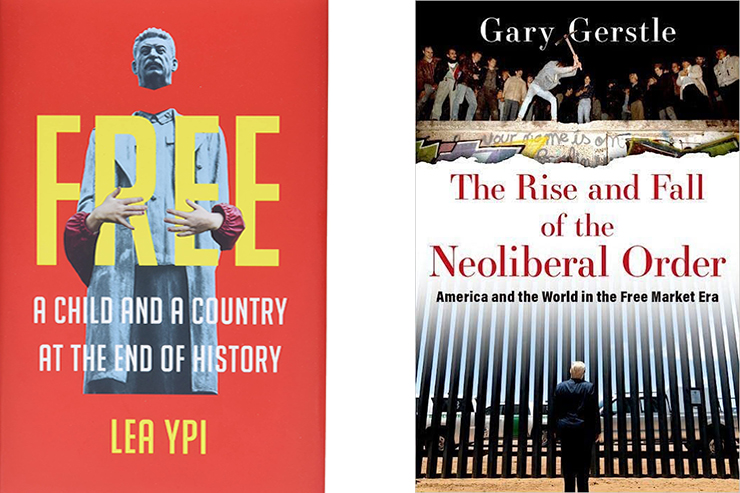
Free: A Child and a Country at the End of History, by Lea Ypi (W. W. Norton; 288 pp., $27.95). The memoir genre has become more crowded than pop-up COVID test sites in the bluest precincts. Readers can choose between Justin Bieber’s First Step 2 Forever: My Story or Paris Hilton’s Confessions of an Heiress. Silly authors write silly books about silly topics, like themselves. We need a vaccine to halt this pandemic of featherbrained self-absorption.
Luckily for astute readers of memoirs, a rare, healthy variant has emerged from the UK. London School of Economics professor Lea Ypi has written about growing up in Communist dictator Enver Hoxha’s nation-turned-lunatic asylum, Albania, and the country’s disintegration after Communism’s collapse.
The average American’s knowledge of Albania began and ended in 1985 when Cheers bartender Coach taught Sam that we learn about countries by associating them with music. Sung to the tune of “When the Saints Go Marching In,” Coach’s ditty pinpointed the Balkan nation’s Cold War geostrategic irrelevance: “Albania! Albania! You border on the Adriatic, your land is mostly mountainous, and your chief export is chrome.” Ypi’s engaging prose depicts the unreported horrors Albanians suffered, stuck between what Hoxha’s regime identified as the “imperialist” West and the “revisionist” Soviet East, even as leaders in Moscow and Washington couldn’t find the Balkan basketcase on a map.
Readers must remind themselves that Ypi is writing about Communist Albania, not Biden’s America. One can only wonder how—if at all—Ypi’s 1980s “moral education class” differed from the illiberal race, class, and gender curricula popular in American public schools today.
From Ypi’s perspective, the Albanian regime was more forgiving than America’s woke Stasi. After she and her friends giggled in class on the day Uncle Enver died, her teacher didn’t cancel them on Twitter or get them expelled. Instead, she forced them “to stand in the corner, to reflect.” Albania’s profane schools taught her that “Science and reason were all that mattered,” echoing the CDC’s “stop the spread” scientism.
Ypi’s parents warned her “You must never again say these stupid things to anyone” after she blurted out her secret contempt for Hoxha in front of houseguests. See how your closest friend reacts by forwarding one of his politically incorrect emails. And then remember you live America, not Albania. Ypi’s day-by-day account of Albania’s brutal 1997 civil war will terrify those who see an American parallel. You’ll recognize America’s summer of 2020 when she concludes, “It’s like a whole country committing suicide.”
(John Greenville)

The Rise and Fall of the Neoliberal Order: America and the World in the Free Market Era, by Gary Gerstle, (Oxford University Press; 432 pp., $27.95). In this important new book, Cambridge historian Gary Gerstle sagaciously divides American history’s last hundred years into two inimical political orders, or “constellation[s] of ideologies, policies, and constituencies that endure beyond … election cycles.” The New Deal order began with FDR’s restructuring of Depression-era America in the 1930s, peaked during the 1950s and 1960s, and eventually crumbled thanks to the 1970s’ intractable stagflation. The subsequent neoliberal order rose phoenix-like from stagflation’s ashes, hit its stride between 1990 and the late 2000s, and ultimately disintegrated during the Great Recession.
Like the Progressives before them, New Dealers feared unfettered capitalism. They preferred a greatly empowered central state and heavy-handed regulation to rein in capitalism’s excesses. After FDR imposed his revolutionary agenda, Republicans opportunistically moved left, compromising with big government and labor unions, in their existential war against communism.
The class compromise between labor and capital smoothed out the business cycle through progressive taxation, collective bargaining, and Social Security. Two generations of blue-collar workers lived the American Dream after WWII. But 20 years before communism’s 1991 implosion, the Vietnam War, miserable race relations, and the 1970s economic decline made the New Deal order unworkable.
Gerstle helpfully pins down neoliberalism’s annoyingly protean definition as “free trade and the free movement of goods and people.” Readers will hear echoes of Adam Smith. But neoliberalism expands Smith’s classically liberal horizon when it “valorizes cosmopolitanism,” the byproduct of oxymoronic “open borders” and the “involuntary mixing of … diverse peoples.” Neoliberalism’s fallout left deplorables uprooted, unemployed, and unattached.
More insidiously, neoliberalism’s scientism infected “marriage, family, morality, education, and even sports.” Its “theory of human capital” reduced humanity to “inputs and outputs, investments and returns.” The top 1 percent saw its share of national income double to 80 percent from 1980 to 2005. Profits overrode people, and now kindergarten teachers moonlight as bartenders. Gerstle’s alarming conclusion is that the new reigning order will be disorder.
(John Greenville)

Leave a Reply